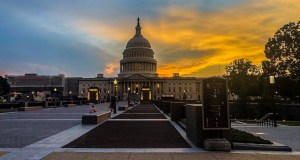Future Congress will ‘facilitate better coordination’ between advocates for tech expertise on the Hill

Proponents of a more tech-savvy Congress are reaching across ideological lines to join forces.
On Monday, a group of more than 20 bipartisan advocacy organizations, as well as a number of individuals, launched Future Congress — a “resource hub” dedicated to “efforts to improve science and technology expertise in the legislative branch.”
Future Congress isn’t so much a new initiative for member organizations as it is a new focal point for existing efforts. For many of the founding members, improving tech expertise on Capitol Hill has been a longstanding effort — member TechCongress, for example, runs a year-long fellowship that places technologists in the offices of members of Congress.
“Innovation, both in government and the private sector, requires a well-crafted policy environment that reflects sensible decisions about if, when, and how government should engage,” the group’s mission statement reads. “Unfortunately, Congress’s dearth of technological expertise hinders its ability to properly evaluate different policy approaches and their risks. This incentivizes bad policies and prolonged inaction, both of which have negative consequences for America’s economic growth and global competitiveness.”
Daniel Schuman, policy director at Demand Progress, acknowledges that the group is “building on longstanding previous efforts.” There’s been a sea change more recently though, he says — despite longstanding political hesitancy to spend money on Congress, events like the infamous Zuckerberg hearings in April are helping to convince onlookers that Congress really does need some help.
To Schuman, Future Congress’s existence is both a reflection of this pendulum swing and an opportunity to take it further.
To Zach Graves, head of policy at the Lincoln Network, Future Congress is all about bringing together disparate voices to “facilitate better coordination” around equipping Congress with technology expertise. Graves will readily point out that there is a lot of diversity in the group when it comes to deciding what the best mechanism for fulfilling the stated mission is. Some, like Demand Progress, fully support reviving the erstwhile Office of Technology Assessment (OTA). Others may prefer another option.
As such, it would be “shortsighted” to say that success for the group simply means the revival of OTA, Graves said. “No one thing is a panacea,” he told FedScoop. “These are not near-term challenges. These are things that are going to take years to reverse the decline.”
And Future Congress is on it — in the coming months, Graves said, the group will host events and add members and aggregate resources on its Wiki.
“As hokey as it sounds, we’re hoping to elevate the debate,” Schuman said.






